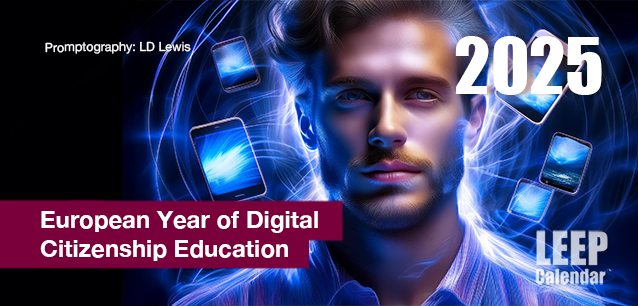 AD
AD
Today is: November 30
Scroll to explore events active on this date.
Additional Events on LEEP
LEEP INK FEATURES

August? Absolutely!
In August, we live through the Dog Days of Summer. It's hot and often humid, and those who can leave for better climates do. Down south, winter is in full force. August is also known as "the ...

In The Heat of July: July 2025 Events
Is it hot enough (or cold enough if you're below the equator) for you yet? There is actually a day for that! Like every month, I pick a diverse collection of events you may or may not know about. This ...

May Blooms: Events in May 2025
Along with October, May is one of the most densely packed months of the year. It's before the summer humidity and the last whole month of the school year. The weather is warming in t...
About 2025, the European Year of Digital Citizenship Education
Safety & Security , Career
Eastern Europe , European Countries
Ends: Dec 31, 2025
DESCRIPTION:
EUROPEAN UNION'S YEAR OF DIGITAL CITIZENSHIP EDUCATION:
FOSTERING RESPONSIBLE ONLINE ENGAGEMENT
The European Union has declared 2025 the European Year of Digital Citizenship Education, aiming to enhance citizens' awareness and understanding of digital citizenship. This initiative comes as the digital landscape rapidly evolves, necessitating a focus on the rights, responsibilities, and skills required to navigate the online world safely and effectively.
Digital citizenship refers to the responsible and ethical use of digital technology. It encompasses a range of skills and behaviors, including online safety, digital literacy, and the ability to engage positively and respectfully in digital communities. An Excellent digital citizen understands the impact of their online actions and strives to contribute positively to the digital environment.PURPOSE OF THE EU YEAR OF DIGITAL CITIZENSHIP EDUCATION
The European Year of Digital Citizenship Education seeks to:
Raise Awareness—Increase understanding of digital citizenship and its importance in the modern world.
Enhance Skills—Equip citizens with the necessary skills to navigate the digital landscape safely and effectively.
Promote Responsibility—Encourage responsible and ethical online behavior.
Protect Vulnerable Groups—Highlight certain groups' risks and provide resources to protect them from digital predators.
Mariya Gabriel, European Commissioner for Innovation, Research, Culture, Education, and Youth, emphasized the initiative's importance: "In an increasingly digital world, it's crucial that all citizens understand their rights and responsibilities online. This year will focus on empowering individuals with the knowledge and skills needed to be responsible digital citizens."BECOMING A GOOD DIGITAL CITIZEN
An excellent digital citizen embodies several key traits:
Digital Literacy—Understanding how to use digital tools and platforms effectively and responsibly.
Online Safety—Protecting personal information and being aware of potential risks such as phishing scams and malware.
Respect and Empathy—Engaging in respectful communication and considering the impact of one's actions on others.
Critical Thinking—Evaluating the credibility of online information and recognizing misinformation and fake news.WHO IS MOST AT RISK FOR DIGITAL PREDATORS?
Certain groups are particularly vulnerable to digital predators, including:
Children and Teenagers—Online predators often target young people due to their lack of experience and understanding of online risks.
Elderly Individuals—Seniors may be less familiar with digital technology and more susceptible to scams and misinformation.
Individuals with Limited Digital Literacy—Those who need more skills to navigate the digital world safely are at higher risk of exploitation.
As the European Union embarks on the European Year of Digital Citizenship Education, the focus will be on fostering a culture of responsible and ethical online engagement. By raising awareness, enhancing skills, and promoting responsible behavior, the EU aims to equip its citizens with the tools to navigate the digital world safely and effectively. In doing so, it seeks to protect vulnerable groups and ensure that the benefits of digital technology are accessible to all while mitigating its risks.
VIDEOS
SUPPORTING DOCUMENTS
Currently, this event does not have supporting documents.
ADDITIONAL IMAGES
Currently, this event does not have supporting images.
Where would you like to go now?
 AD
AD


/footer-logo.svg)
